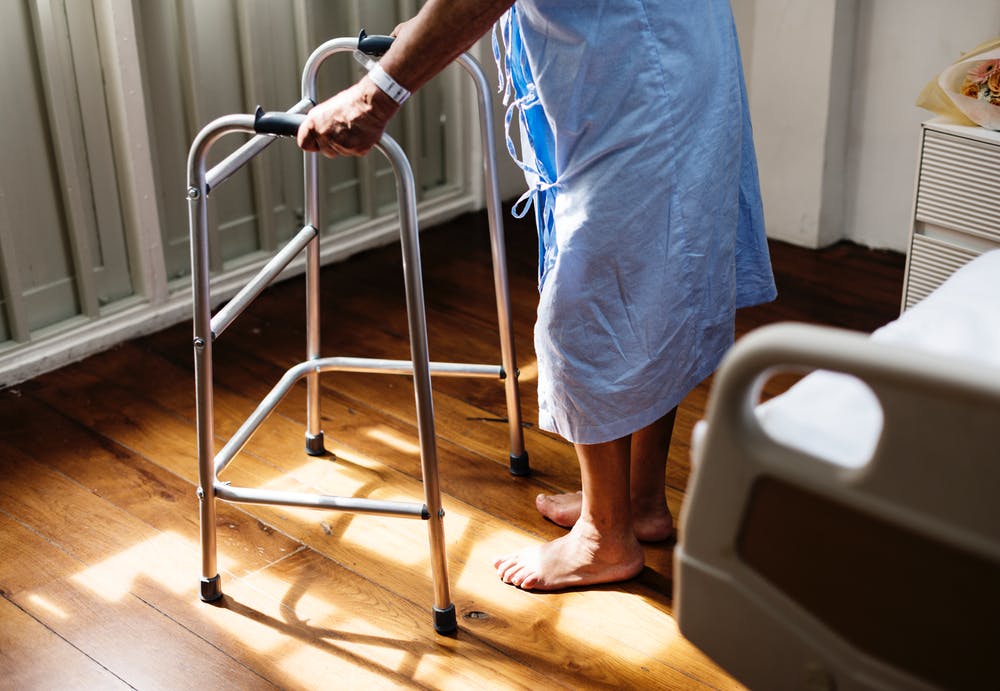nalco group
bone, muscle & joint pain physio
BOOK NOW / WHATSAPP ABOUT YOUR PAIN OR INJURY
- NOVENA 10 Sinaran Drive, Novena Medical Center #10-09, Singapore 307506
- TAMPINES 9 Tampines Grande #01-20 Singapore 528735
- SERANGOON 265 Serangoon Central Drive #04-269 Singapore 550265
Home > Blog > Physiotherapy > Conditions > Frailty and Debility Physiotherapy
Frailty and Debility Physiotherapy

Frailty is a syndrome of overall body weakness resulting in a loss of
- strength
- flexibility
- balance
- endurance
This unfortunately leads to an inability to perform everyday activities, such as preparing meals, washing, dressing, or caring for a family member.
Debility, on the other hand, is the loss of the ability to move around normally, or productively, in one’s home and community.
Typically, frailty and debility occur in people who have not moved their bodies for an extended period of time. In the elderly population in the United States, people develop frailty at a rate of 9.6%.
There is a condition called “prefrailty” which develops in 47% of the elderly population.
Frankly, young people are not excluded from this. They also can become frail and debilitated from trauma, disease, chronic pain, or any reduction in physical activity.
Among critical care patients in hospitals (patients warded in intensive care units, or have been hospitalized for an extended period of time), up to 30% are found to be frail.
Patients who have diabetes and coronary artery disease at midlife are more likely to become frail as they age.
Our senior physiotherapists help individuals experiencing frailty and debility restore their
- strength
- flexibility
- endurance
- balance
- overall mobility
- reduce chronic pain
- improve their daily function
What are Frailty and Debility?
When a person’s body does not move for a long period of time, he or she will gradually decline and suffer loss of strength, flexibility, endurance, balance, and mobility (the ability to move easily and perform common activities).
Specific problems that can result are:
- Muscles become smaller, weaker, and tighter (known as “sarcopenia”)
- Joints become stiffer
- Heart and lung function (cardiovascular system) weakens
- The natural sense of balance malfunctions
All of these effects lead to frailty—being too weak, tired, and unsteady to perform normal daily activities.
Frail people often are scared or reluctant to perform activities that make them tired and avoid doing them, which increases their frailty over time. Most of the time, frail people do not understand or takes actions to improve their condition, so they continue being inactive.
The risk of becoming frail increases in people aged 80 or older because they often reduce their physical activity due to:
- Chronic pain
- Fatigue from medications or diseases
- Fear of discomfort or pain
- Disinterest
- Inactivity
- Lack of understanding of how aging can cause frailty
- Lack of understanding of the importance of physical activity at all ages
Younger people also can suffer frailty and debility, if they have been inactive or on bed rest for a period of time due to illness, surgery, sedentary or injury.
When a person becomes frail or debilitated from lack of movement, he or she is at a greater risk of falling and suffering injuries that can lead to hospitalization, disability, and death.
Signs and Symptoms
Someone who suffers from frailty or debility may experience:
- Severe fatigue, weakness, or exhaustion
- Low energy
- Difficulty standing, sitting, or walking
- Difficulty getting out of bed or out of a chair, without help
- Difficulty walking
- Inability to perform simple household tasks
- Fear of losing one’s balance and falling
- Inability to work
- Inability to socialize with friends and family
How Is It Diagnosed?
Frailty and debility can be diagnosed by your doctor or by our senior physiotherapists. We will conduct a thorough examination to determine your:
- Strength
- Flexibility
- Balance
- Endurance
- Mobility
The physical therapy examination will include questions about your
- health
- symptoms
- how well you move around
- hands-on physical testing and observation of your movements
how our senior physiotherapists can help
Our senior physiotherapists help frail or debilitated individuals gradually improve their activity levels.
We will design a treatment program based on your specific condition to help you regain the stamina and endurance needed to return to enjoyable and important daily physical activities. We will work with you to safely get you moving again.
We will help you:
Reduce pain
Physical therapy treatment is a safe way to treat chronic pain.We may use different types of treatments and technologies to control and reduce your pain. Exercise is one of the best ways to reduce pain, and we will choose the most effective and safe exercises for you to do.
Improve motion
We will choose specific activities and treatments to help restore normal movement. These might begin with "passive" motions that the physical therapist performs for you to gently move your joints, and progress to “active” exercises and stretches that you can do yourself.
Improve flexibility
We will determine if any muscles are tight, begin to gently stretch them, and teach you how to stretch them.
Improve strength
We will choose and teach you the correct exercises and equipment to use, to steadily and safely restore your strength.
Improve endurance
Regaining your muscular endurance is important. We will teach you exercises to improve endurance, so you can return to your normal activities.
Improve balance
Regaining your sense of balance is important to prevent falling. We will teach you exercises to improve your balance ability.
Return to activities.
We will discuss activity goals with you and use them to set your recovery goals. Your treatment program will help you reach your goals in the safest, fastest, and most effective way possible.
Educate your family
We can educate both you and your family about the negative effects of prolonged sitting and bed rest, and about ways to prevent and limit frailty.
Modify your home for safety
We will help you and your family reduce hazards in the home that could increase your risk of falling.

